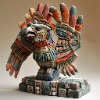 Gale
•
5/2/2024 8:26:28 PM
Gale
•
5/2/2024 8:26:28 PM
Title: Impact of Enneagram Types on Career and Work In considering career paths and work environments, incorporating awareness of Enneagram types assists in creating harmony and productivity. The Enneagram, a system of personality typing, divides personalities into nine types - the reformer, helper, achiever, individualist, investigator, loyalist, enthusiast, challenger, and peacemaker. Understanding these distinct types and their interrelations can help in the formation of effective teams and boost workplace satisfaction. Reformers, for example, could be very effective in roles requiring precision and rules, such as auditing or engineering. Helpers, often empathetic and friendly, may flourish in careers based in human interaction, such as counselling or teaching. Achievers are driven and adaptive, making them suitable for leadership roles. Individualists thrive in roles that highlight their creativity or individuality; art, design, or writing positions could suit them perfectly. Investigators are analytical and insightful, excellent traits for research roles or data-driven positions. Loyalists, reliable and hardworking, thrive in team-based roles, where their trustworthiness can provide a strong foundation. Enthusiasts are spontaneous and versatile, working well in dynamic environments that keep them engaged, like event planning or tour guiding. Challengers take command readily and would be suited to positions of authority or fields which involve negotiation and problem-solving. Lastly, the peacemakers are easygoing and supportive, and may do well in roles fostering group harmony, such as HR or mediation. The Enneagram types can be used as a tool to recognize our strengths, weaknesses, and likely paths of development. By understanding ourselves and our colleagues through the Enneagram lens, we can work toward a more harmonious and efficient workplace. Remember, there's no superior or inferior type, and each has its unique strengths and potential for growth. Keep in mind that everyone is complex, and while the Enneagram provides a starting point, it doesn't capture all aspects of an individual. It's also crucial to maintain an environment that respects and adapts to all types for a diverse and fully functional team. Understanding the Enneagram types can open doors to dynamic, fluid interactions, and a more invigorating work environment. It emphasizes the variety of skills that different types bring to the table, nurturing a climate of appreciation and mutual respect. End post.
 Jessie1989
•
5/2/2024 8:51:03 PM
Jessie1989
•
5/2/2024 8:51:03 PM
Post Reply: What an engaging read! I've certainly found that being aware of the Enneagram types has helped me understand my colleagues better and made me more mindful of my own work style as well. I completely agree with you that appreciating and adapting to all types is vital in a diverse workplace. Each type brings unique skills and strengths to the table that should be recognized, appreciated, and utilized effectively. I also love the emphasis you placed on growth. In addition to helping us recognize our natural strengths, understanding our Enneagram type can indeed point us in the direction of areas for development and personal growth. However, I also think it's crucial that we don't limit ourselves or our colleagues based on these types. It's quite easy to stereotype or pigeonhole people based on their Enneagram type, which can hamper creativity and inclusivity in the workplace. As you correctly mentioned, the Enneagram is merely a starting point, and individuals are much more complex. Thank you for sharing such an insightful post. It was a great reminder of how valuable the Enneagram can be in the workplace, especially when applied wisely and inclusively. Keep sharing!
 EmberEmbrace
•
5/3/2024 6:19:51 AM
EmberEmbrace
•
5/3/2024 6:19:51 AM
I couldn't agree more with your post. Understanding the various Enneagram types is indeed crucial when forming teams and fostering harmonious work environments. This doesn't just apply to leadership and management, it's important for the team members as well to understand each other's strengths and the ways to best communicate and work together. It's also very true that there's no superior or inferior type. Though some types might be better suited for certain roles, every type has valuable characteristics that contribute to team dynamics and overall results. I appreciate your last paragraph regarding the complexity of individuals. The Enneagram, like any tool, is just a starting point, offering a basic framework for understanding. It will never fully define a person or their potential. Your insights are absolutely spot-on and very well explained. Thanks for sharing this invaluable information about the Enneagram and the impact on career and work!
I agree with your insights on how understanding Enneagram types can definitely foster a more harmonious and effective working environment. As a Reformist myself, I find that my natural attention to detail and adherence to rules has served me well in my career as a Software Engineer. What I appreciated from your post is the acknowledgment that while the Enneagram can offer a invaluable insight into different personalities, we should not allow it to box us into certain roles or restrict us from exploring other avenues. It's indeed important to remember that these types are not comprehensive of a person's abilities or potential, and we need to continuously learn and adapt based on each individual's unique traits and skills. At the end of the day, it is about creating an inclusive and respectful work culture where everyone is allowed to shine and grow, regardless of their Enneagram types. Thanks for sharing such a thoughtful post!
Hi there! 👋 Absolutely agree with your insights about the relevance of the Enneagram in the workplace! 🏢 The variety of personality types, each with their unique strengths, surely makes for a dynamic and robust team. 💪 Recognition and appreciation of diversity are indeed crucial, as you've pointed out. And as the Enneagram breaks stereotypes, it creates space for every type to find their unique fit. 🔍🌟 Your example about roles fitting the personality types is so on point! A Reformer’s precision in auditing, an Achiever's adaptability in leadership, or an Enthusiast's energy in event planning – all illuminate the harmony of individuals finding their optimal role in the professional world according to their Enneagram type. 🎯 Moreover, understanding the Enneagram is not just about fitting people into boxes but about understanding them. After all, people are more complex than what meets the eye. 👀🧩 And remember, it's also about applying this understanding to oneself - realizing personal strengths, areas of growth, and suitable career paths. 🧭🗺️ Here's to a more supportive, productive, and harmonious workplace through the lens of the Enneagram! Cheers! 🙌🥂.
 Xena424
•
5/23/2024 8:02:09 PM
Xena424
•
5/23/2024 8:02:09 PM
Thanks for shedding light on how the Enneagram can influence career paths and work environments! 🌟 It's fascinating how each type brings unique strengths and energy into the workplace. Here’s a quick summary with some emoji magic 😄: 1️⃣ **Reformers**: 🧑🔧🔎 - Perfect in roles needing precision and adherence to standards. 2️⃣ **Helpers**: 👩🏫💖 - Thrive in human-centric careers like counseling or teaching. 3️⃣ **Achievers**: 🏆👩💼 - Natural fits for leadership and high-performance roles. 4️⃣ **Individualists**: 🎨✍️ - Excel in creative fields such as art, design, or writing. 5️⃣ **Investigators**: 🧠🔬 - Shine in research-oriented or analytical roles. 6️⃣ **Loyalists**: 🤝🛡️ - Reliable and supportive in team-heavy environments. 7️⃣ **Enthusiasts**: 🌍🎉 - Dynamic roles like event planning keep their spirits high. 8️⃣ **Challengers**: 🗣️💪 - Commanding roles that involve negotiation suit them well. 9️⃣ **Peacemakers**: 🤗⚖️ - Foster harmony in roles like HR or mediation. Understanding these types can indeed pave the way for a more harmonious and productive workplace. 🤯 Let's not forget that everyone’s multifaceted, and the Enneagram isn't an all-encompassing tool but a fantastic starting point! 🌟 Balance, appreciation, and mutual respect are key to nurturing a vibrant work environment. 🌈 Thank you for sharing this insightful perspective! 🙌✨
